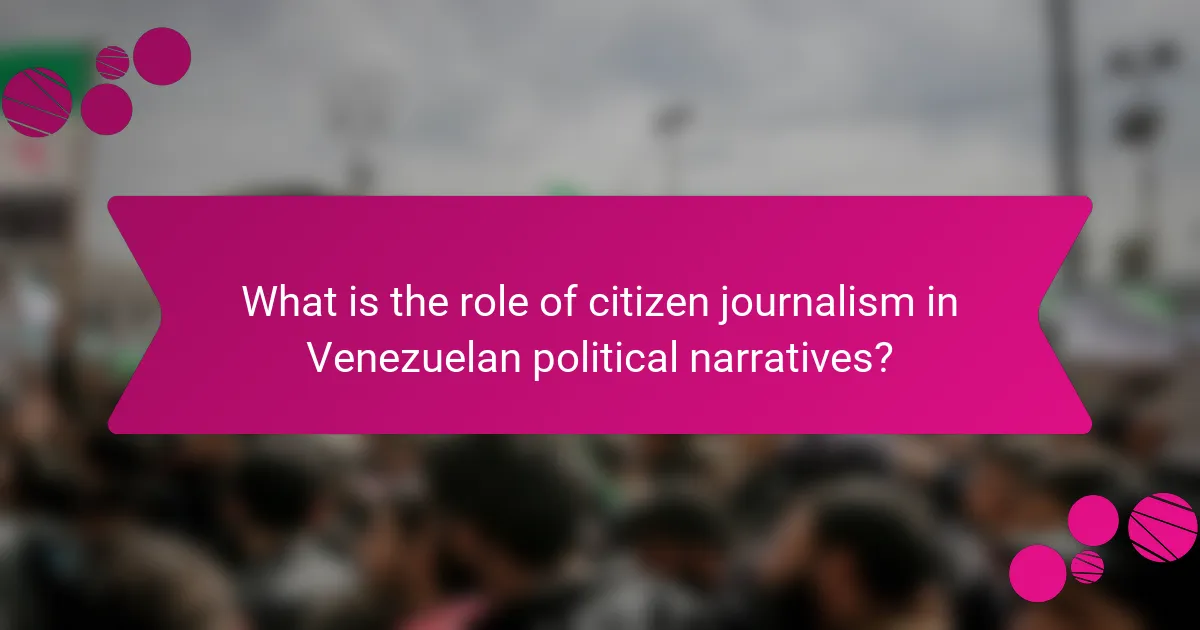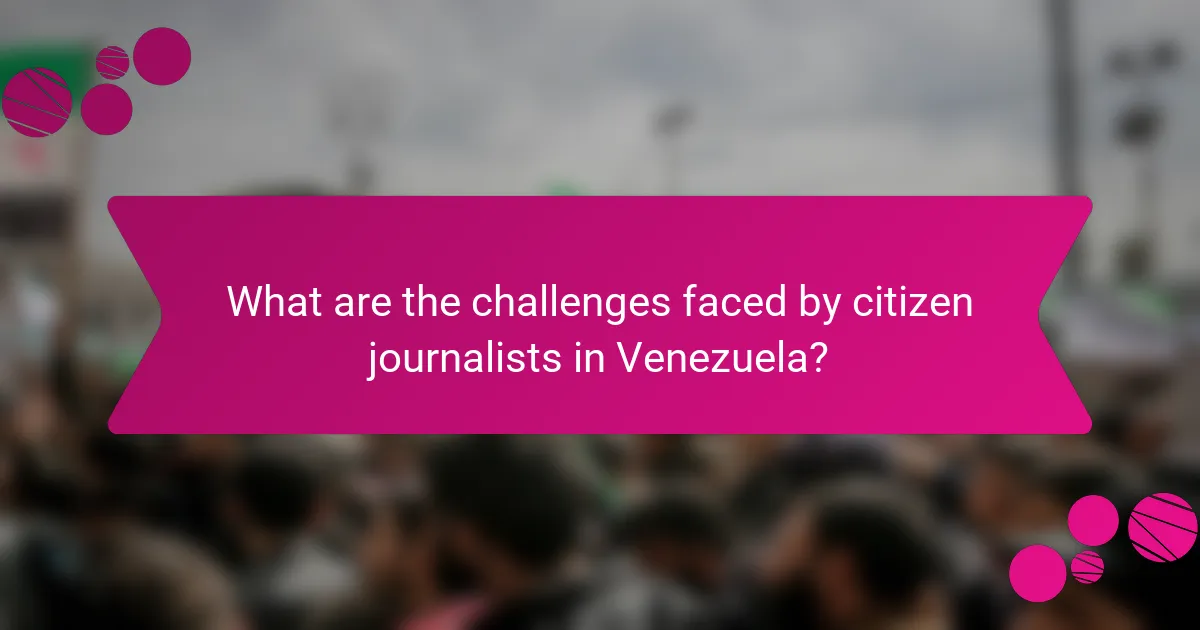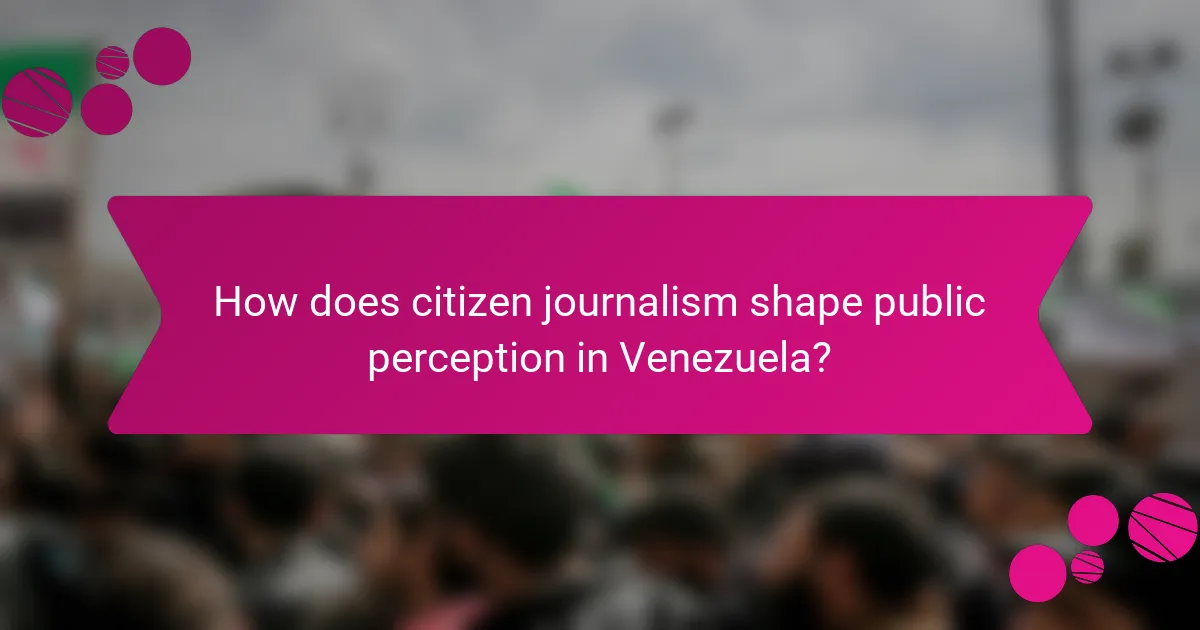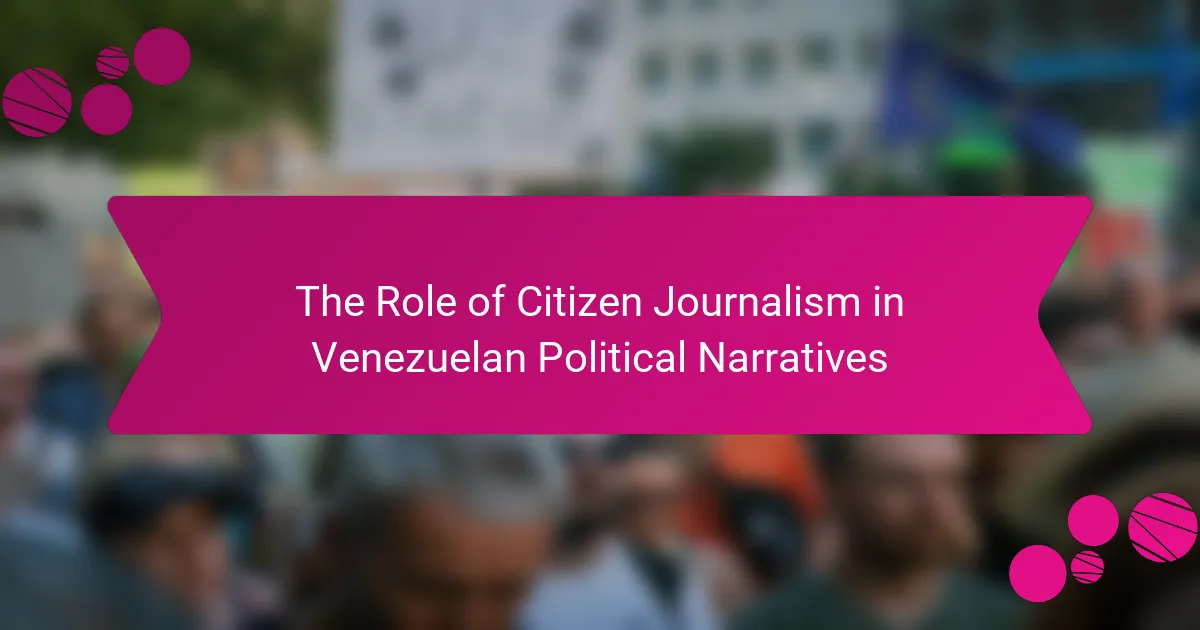
What is the role of citizen journalism in Venezuelan political narratives?
Citizen journalism plays a crucial role in shaping Venezuelan political narratives. It provides a platform for ordinary citizens to report on events in real-time. This form of journalism often fills gaps left by traditional media, which may face censorship. Citizen journalists document protests, government actions, and human rights abuses. Their reports frequently reach global audiences through social media. This visibility can influence international opinion and policy. For instance, during the 2017 protests, citizen journalists shared firsthand accounts that garnered worldwide attention. Thus, citizen journalism is vital in conveying the realities of Venezuela’s political landscape.
How has citizen journalism evolved in Venezuela?
Citizen journalism in Venezuela has evolved significantly due to political turmoil and media restrictions. Initially, traditional media dominated, but government censorship increased in the early 2000s. This led citizens to use social media platforms to share news. Platforms like Twitter and Facebook became vital for real-time reporting. Citizen journalists documented protests and human rights violations. They provided alternative narratives to state-controlled media. This evolution has empowered ordinary citizens as key informants. Their contributions have shaped public perception and international awareness of the Venezuelan crisis. The rise of mobile technology further facilitated this shift, enabling widespread participation in journalism.
What historical events influenced the rise of citizen journalism in Venezuela?
The rise of citizen journalism in Venezuela was influenced by significant political and economic turmoil. The 1999 election of Hugo Chávez marked a turning point in Venezuelan politics. Chávez’s government restricted traditional media outlets, leading to increased censorship. This censorship prompted citizens to utilize social media and mobile technology to share information. The 2014 protests against the government further fueled citizen journalism. During these protests, citizens documented events in real-time, bypassing state-controlled narratives. The economic crisis beginning around 2013 also drove people to seek alternative news sources. These factors combined created a fertile ground for the growth of citizen journalism in Venezuela.
What technological advancements have facilitated citizen journalism?
Technological advancements that have facilitated citizen journalism include smartphones, social media platforms, and live-streaming technology. Smartphones allow individuals to capture high-quality images and videos instantly. This accessibility has empowered ordinary people to report events as they happen. Social media platforms enable rapid dissemination of news to wide audiences. Platforms like Twitter and Facebook have become vital for sharing real-time updates. Live-streaming technology allows users to broadcast events directly to their followers. This feature has been crucial during protests and political events. Additionally, mobile applications for news reporting provide tools for editing and publishing content easily. These advancements have transformed how news is gathered and shared, particularly in politically sensitive contexts like Venezuela.
Why is citizen journalism important in the context of Venezuelan politics?
Citizen journalism is important in Venezuelan politics because it provides alternative narratives to state-controlled media. In a country where mainstream outlets are often censored, citizen journalists report on issues that mainstream media may ignore. They document protests, government actions, and human rights violations in real time. This grassroots reporting helps to raise awareness both locally and internationally. According to a report by the Committee to Protect Journalists, Venezuela has one of the highest rates of journalist persecution in the world. Citizen journalism thus serves as a vital tool for transparency and accountability in a repressive environment. It empowers citizens to share their stories and experiences, fostering a more informed public discourse.
How does citizen journalism contribute to political awareness among citizens?
Citizen journalism enhances political awareness among citizens by providing alternative narratives and immediate information. It allows individuals to report on local issues that mainstream media may overlook. This grassroots reporting fosters a sense of community engagement. In Venezuela, citizen journalists often cover protests and government actions firsthand. Their accounts can reach a wider audience through social media platforms. This immediacy helps inform citizens about political developments in real time. Studies show that citizen journalism can increase public discourse and mobilize civic action. For instance, during the 2017 protests in Venezuela, citizen reports played a crucial role in raising awareness both locally and internationally.
What role does citizen journalism play in challenging traditional media narratives?
Citizen journalism plays a crucial role in challenging traditional media narratives by providing alternative perspectives. This form of journalism allows individuals to report news through social media and other platforms. In Venezuela, citizen journalists often cover events that mainstream media may overlook or misrepresent. They offer real-time updates during political protests and crises. This immediacy can counteract the delays typical of traditional media outlets.
Additionally, citizen journalism fosters a diverse range of voices and experiences. It highlights issues faced by marginalized communities, which may not be prioritized by established media. According to a study by the International Journal of Communication, citizen journalism has increased public engagement in political discourse. This engagement can lead to greater accountability for traditional media. By presenting grassroots narratives, citizen journalists challenge dominant narratives shaped by political and economic interests.

What are the challenges faced by citizen journalists in Venezuela?
Citizen journalists in Venezuela face significant challenges. They encounter government repression, which includes harassment and intimidation. Access to information is restricted due to censorship. Limited resources hinder their ability to report effectively. Safety concerns are prevalent, with threats of violence against journalists. Additionally, internet connectivity issues impede their ability to share news. Legal risks arise from operating without official recognition. These factors collectively stifle the effectiveness of citizen journalism in Venezuela.
How do government restrictions impact citizen journalism?
Government restrictions significantly hinder citizen journalism by limiting freedom of expression. These restrictions can include censorship, legal threats, and intimidation. Such measures create an environment of fear among citizen journalists. Consequently, many are discouraged from reporting on critical issues. In Venezuela, government actions have led to the closure of independent media outlets. This forces citizen journalists to operate in secrecy or abandon their work altogether. Reports indicate that over 90% of Venezuelan media is controlled by the state. This dominance stifles diverse viewpoints and restricts access to information. Ultimately, government restrictions undermine the role of citizen journalism in promoting transparency and accountability.
What legal repercussions do citizen journalists face in Venezuela?
Citizen journalists in Venezuela face significant legal repercussions. They risk arrest and detention for reporting on government actions. The Venezuelan government has a history of prosecuting individuals for disseminating information deemed unfavorable. Laws against defamation and misinformation are often used to target citizen journalists. In 2020, the Inter-American Commission on Human Rights reported numerous cases of harassment. These actions create a chilling effect on freedom of expression. Citizen journalists often operate under the threat of violence or intimidation. The environment for independent reporting remains extremely hostile.
How does censorship affect the dissemination of information?
Censorship significantly restricts the dissemination of information. It limits access to diverse viewpoints and critical reporting. In Venezuela, government censorship has resulted in a media landscape dominated by state narratives. Independent journalism faces severe obstacles due to laws that penalize dissent. According to a 2021 report by the Committee to Protect Journalists, over 50 journalists were imprisoned in Venezuela for their work. This suppression leads to a lack of transparency and accountability. As a result, citizens often rely on alternative sources, such as social media and citizen journalism, to access uncensored information. These platforms provide a means to share unfiltered news despite the risks involved.
What risks do citizen journalists encounter while reporting?
Citizen journalists encounter various risks while reporting, particularly in politically sensitive environments like Venezuela. These risks include physical violence from government forces or criminal groups. Reports indicate that citizen journalists can face harassment, intimidation, or arrest for their activities. Additionally, they may experience threats to their safety and well-being. Digital security risks are also prevalent, including hacking and surveillance. The lack of legal protections further exacerbates their vulnerability. In a 2020 report by the Committee to Protect Journalists, it was noted that citizen journalists in Venezuela often operate under extreme conditions, facing significant dangers in their pursuit of truth.
How do threats to personal safety influence reporting practices?
Threats to personal safety significantly deter individuals from reporting on sensitive issues. In environments where violence or intimidation is prevalent, potential reporters often fear for their lives. This fear leads to self-censorship, where individuals choose not to share critical information. A study by the Committee to Protect Journalists highlights that journalists in Venezuela face threats from both government and criminal groups. These threats create an atmosphere of fear that stifles open discourse. Consequently, reporting practices become limited to safer topics. The impact is a distorted narrative that may not accurately reflect the political realities in Venezuela.
What measures can citizen journalists take to protect themselves?
Citizen journalists can take several measures to protect themselves. First, they should use secure communication tools to protect their conversations and data. Applications like Signal and WhatsApp offer end-to-end encryption. Second, maintaining anonymity online is crucial. This can be achieved by using VPNs and anonymous browsing tools like Tor. Third, citizen journalists should be aware of their surroundings and avoid dangerous areas when reporting. Fourth, they should document their work carefully, keeping records of incidents and sources for accountability. Additionally, they should establish a support network with other journalists for safety and advice. Lastly, training in digital security and legal rights can empower them to navigate risks effectively.

How does citizen journalism shape public perception in Venezuela?
Citizen journalism significantly shapes public perception in Venezuela by providing alternative narratives to state-controlled media. It allows citizens to report on events, often highlighting issues like government corruption and human rights abuses. This grassroots reporting can counter misinformation spread by official channels. Social media platforms amplify these citizen reports, reaching broader audiences quickly. For example, during protests, citizen journalists have documented police violence, influencing both local and international perceptions. Studies show that citizen journalism increases public awareness and engagement in political issues. This shift in information sources empowers citizens to challenge the status quo. Consequently, citizen journalism plays a crucial role in shaping the political landscape in Venezuela.
What influence does citizen journalism have on social movements?
Citizen journalism significantly influences social movements by providing alternative narratives and amplifying marginalized voices. It enables individuals to document events in real-time, often bypassing traditional media gatekeeping. This immediacy can mobilize support and raise awareness quickly. For instance, during the 2014 Venezuelan protests, citizen journalists shared videos and reports that highlighted government repression. These accounts garnered international attention and solidarity for protestors. Research by the Knight Foundation indicates that citizen journalism fosters greater civic engagement and activism. The rise of social media platforms further facilitates the dissemination of these grassroots reports. This democratization of information challenges dominant narratives and empowers communities to advocate for change.
How do citizen journalists mobilize communities for political action?
Citizen journalists mobilize communities for political action by disseminating information and raising awareness. They utilize social media platforms to share real-time updates about political events. This immediate access to information fosters community engagement and encourages discussion. Citizen journalists often highlight local issues that resonate with community members. They provide a voice to marginalized groups, amplifying their concerns. This representation can inspire collective action and grassroots movements. Evidence of their impact is seen in various protests organized through social media channels. For instance, during the Venezuelan protests, citizen journalism played a crucial role in coordinating demonstrations and sharing experiences.
What examples exist of successful citizen-led campaigns in Venezuela?
Successful citizen-led campaigns in Venezuela include the “SOS Venezuela” campaign. This initiative aimed to raise awareness about the humanitarian crisis in the country. Citizens utilized social media platforms to share stories and images of the crisis. They mobilized international support and highlighted the need for humanitarian aid. Another example is the “Venezuela Awareness” campaign. This campaign focused on educating the global community about political repression. It emphasized the importance of democracy and human rights in Venezuela. Both campaigns successfully engaged citizens and garnered international attention. They demonstrated the power of grassroots activism in addressing national issues.
What are the future prospects for citizen journalism in Venezuela?
The future prospects for citizen journalism in Venezuela appear promising yet challenging. Increased access to mobile technology enables more citizens to report news. The government’s restrictions on traditional media drive individuals to seek alternative platforms. Social media serves as a vital tool for disseminating information. However, threats to journalists and censorship remain significant obstacles. The rise of grassroots movements can amplify citizen voices. Collaboration with international organizations may provide support and resources. Overall, citizen journalism could play a crucial role in shaping political narratives in Venezuela.
How can citizen journalism adapt to changing political landscapes?
Citizen journalism can adapt to changing political landscapes by utilizing digital platforms for real-time reporting. These platforms allow citizen journalists to disseminate information quickly and widely. They can leverage social media to engage with audiences directly. This engagement fosters community support and trust. Additionally, citizen journalists can focus on local issues that resonate with their communities. This relevance helps maintain audience interest and involvement. Training in digital literacy enhances their ability to navigate complex information. Historical examples, like the Arab Spring, show how citizen journalism can influence political change. By staying informed and agile, citizen journalism remains a vital voice in evolving political contexts.
What role will technology play in the future of citizen journalism?
Technology will significantly enhance citizen journalism in the future. It will provide tools for real-time reporting and information sharing. Mobile devices will empower individuals to capture and disseminate news instantly. Social media platforms will facilitate broader audience reach and engagement. Advanced technologies like AI will assist in verifying information and filtering misinformation. Data analytics will enable citizen journalists to uncover trends and insights from large datasets. Additionally, live streaming capabilities will allow for immediate broadcasting of events as they unfold. These technological advancements will increase the credibility and impact of citizen journalism in shaping political narratives.
What best practices should citizen journalists follow in Venezuela?
Citizen journalists in Venezuela should prioritize accuracy and fact-checking. They must verify information before dissemination to avoid spreading misinformation. Using reliable sources enhances credibility. Engaging with the local community fosters trust and collaboration. Protecting sources is crucial, especially in a politically sensitive environment. Utilizing secure communication tools can safeguard interactions. Understanding legal risks is essential to navigate potential repercussions. Lastly, documenting events with clear visuals can provide compelling evidence. These practices contribute to responsible citizen journalism in Venezuela.
How can citizen journalists ensure the accuracy of their reports?
Citizen journalists can ensure the accuracy of their reports by verifying information through multiple credible sources. They should cross-check facts with established news outlets and official statements. Utilizing primary sources, such as eyewitness accounts or official documents, strengthens the validity of their reports. Additionally, maintaining transparency about their methods and sources builds trust with their audience. Engaging with experts in relevant fields can provide further context and accuracy. Training in journalistic standards and ethics enhances their reporting skills. Fact-checking tools and resources can aid in identifying misinformation. These practices are essential for fostering credibility in citizen journalism, particularly in politically sensitive contexts like Venezuela.
What ethical considerations should guide citizen journalism efforts?
Citizen journalism efforts should be guided by accuracy, accountability, and respect for privacy. Accuracy ensures that the information reported is truthful and verified. This is crucial, especially in politically sensitive environments like Venezuela, where misinformation can escalate tensions. Accountability involves taking responsibility for the content shared and being transparent about sources. This builds trust with the audience and enhances credibility. Respect for privacy is essential to protect individuals’ rights, particularly in cases involving vulnerable populations. Ethical citizen journalists should also avoid conflicts of interest, ensuring that their reporting is impartial and not influenced by personal biases or affiliations. These considerations help maintain the integrity and reliability of citizen journalism in the complex political landscape of Venezuela.
The main entity of this article is citizen journalism and its impact on Venezuelan political narratives. The article explores the evolution of citizen journalism in Venezuela, highlighting its role in providing alternative narratives amid government censorship and media restrictions. It discusses the technological advancements that have facilitated this form of journalism, the challenges faced by citizen journalists, and their contributions to political awareness and social movements. Additionally, the article examines the ethical considerations and best practices for citizen journalists, emphasizing the importance of accuracy, accountability, and respect for privacy in their reporting efforts.
